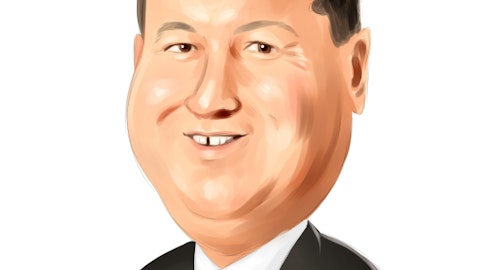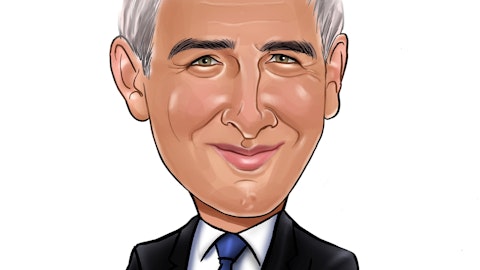With the latest round of 13F filings behind us, we are presenting a series of articles on hedge fund activity during the first quarter to shed some light on the prevailing sentiment among some of the best investors in the world. We track 730 different investment firms at Insider Monkey and know exactly how many of them hold positions in every U.S equity and how much money they have invested in them. In this article we’ll look at the stocks which have seen the most selling activity during the first quarter among the funds in our database, in terms of the dip in fund ownership of those stocks.

There was no specific industry in which hedge funds seemed to be particularly bearish against in terms of their top five sell-offs, unlike with the top five stocks hedge funds were buying during the first quarter, which were primarily tech stocks. A financial company, an energy company, a transportation company and a couple of tech companies in the internet and memory chip segments respectively, make up the list.
At the top of the list is American Airlines Group Inc (NASDAQ:AAL), in which 91 funds held an aggregate investment of $3.47 billion at the end of the first quarter. While that still ranked it as the 20th most popular stock, it was a steep fall from the 123 funds which had an aggregate $6.11 billion investment in the airline at the end of 2014. The capital invested in the stock was also the lowest of the companies in the top 35 of fund ownership. After a very strong year in which it returned over 115%, it appears the smart money has decided to take profits from the stock and move on to something else, as American Airlines Group Inc (NASDAQ:AAL) appears headed for some near-term headwinds, including rising fuel costs. While American Airlines has a fair P/E of 10.45, its price-to-book ratio is a very high 17.39. Among the funds to sell off their stakes in American Airlines Group Inc (NASDAQ:AAL) last quarter were David Tepper’s Appaloosa Management and Dan Loeb’s Third Point.
Ally Financial Inc (NYSE:ALLY) is next up, falling to 67 hedge funds with ownership positions, from 91 a quarter ago, while their invested capital declined to $4.98 billion from $6.29 billion. The biggest blow to Ally Financial Inc (NYSE:ALLY) during the first quarter and the one that likely sent many funds bolting for the exits (though it wasn’t totally unexpected) was the loss of General Motors Company (NYSE:GM) as a customer for lease subsidies. The automaker began solely using its internal finance company, GM Financial, for leases beginning April 1 of this year. That wiped out approximately 10% of Ally Financial Inc (NYSE:ALLY)’s lease originations according to 2014 numbers. Revenue also fell during the financial services company’s fourth quarter 2014 results, announced in late January, and its prospects for near-term growth appear limited. That uninspiring combination led funds like John Armitage’s Egerton Capital and Daniel Och’s OZ Management to close large positions in Ally, whose shares are down by 6% year-to-date.
Baidu Inc (ADR)(NASDAQ:BIDU) lands in the three hole, with 20 less funds owning shares of the Chinese search engine company on March 31 than there were at the end of 2014. All told, fund ownership dipped to 75 from 95 and capital invested fell to $7.01 billion from $8.42 billion. The dip in Baidu Inc (ADR)(NASDAQ:BIDU) came amid a general cautiousness towards China in the first quarter as concerns over the country’s slowing growth weighed on investors. The Chinese government made moves to remedy that in April by announcing a further stimulus package to help kickstart growth. However Baidu’s shares ran into their own problems at the end of April when the company’s latest earnings report missed revenue expectations, sending shares down by 13% over the following week. Some of the investors who closed their positions in Baidu Inc (ADR)(NASDAQ:BIDU) before that dip came are Daniel Benton’s Andor Capital and Chinese investor Lei Zhang of Hillhouse Capital Management.
SanDisk Corporation (NASDAQ:SNDK) comes it at fourth with ownership from 40 funds which have $1.35 billion invested in the memory chip maker, down from 58 funds holding $2.76 billion worth of the company’s shares a quarter earlier. The year got off to a bad start almost immediately for SanDisk Corporation (NASDAQ:SNDK), whose preliminary fiscal fourth quarter 2014 revenue of $1.73 billion came in below its previous guidance of $1.80 to $1.87 billion for the quarter. Things didn’t get any better later in the first quarter as SanDisk was again forced to revise its revenue downward, this time for its first quarter earnings. The result is shares that are down by more than 31% year-to-date as SanDisk struggles under the weight of disappointing sales of iNAND and other retail products and lower margins due to increasing competition in the chip sector. There appears to be strong long-term potential for the stock however, with several potentially booming segments for its chips such as the smart home and internet of things segments. Regardless, Rob Citrone’s Discovery Capital Management has closed its large position in SanDisk Corporation (NASDAQ:SNDK) for now, as has billionaire Steve Cohen.
Lastly is Schlumberger Limited. (NYSE:SLB), which has 48 funds invested in it, down from 65 at the end of 2014, while the aggregate investment of the funds fell to $1.79 billion from $2.08 billion. The energy sector has of course been a rough one for nearly a year now and Schlumberger Limited. (NYSE:SLB) was not immune to that, with first quarter revenue falling by 19% quarter over quarter and 9% year over year, while Schlumberger’s management has further predicted a 30% dip for the company’s North American sales in 2015 and a 15% dip internationally. On the other hand, Schlumberger Limited. (NYSE:SLB) is one of the best oil field service companies in the world which is bound to return to its strong track record of earnings once oil prices rebound according to David Katz of Matrix Asset Advisors, who ranks the stock as one of his top picks. Some investors who didn’t want to stick out the wait included Encompass Capital Advisors and Bluecrest Capital Management.
Why are we interested in the 13F filings and trading activity of a select group of hedge funds? We use these filings to determine the top 15 small-cap stocks held by these elite funds, based on 16 years of research that showed their top small-cap picks are much more profitable than both their large-cap stocks and the broader market as a whole. These small-cap stocks beat the S&P 500 Total Return Index by an average of nearly one percentage point per month in our backtests, which were conducted over the period of 1999 to 2012. Moreover, since the beginning of forward testing from August 2012, the strategy worked just as our research predicted, outperforming the market every year and returning 139% over the last 32 months, which is more than 80 percentage points higher than the returns of the S&P 500 ETF (SPY) (see more details).
Disclosure: None





